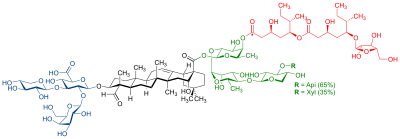QS-21
QS-21 is a purified plant extract used as a vaccine adjuvant. It is derived from the soap bark tree (Quillaja saponaria), which is native to the country of Chile.[1]

The extract contains water-soluble triterpene glycosides, which are members of a family of plant-based compounds called saponins. It is currently being tested as an adjuvant in various vaccines in attempts to improve their efficacy. It is believed to enhance both humoral and cell-mediated immunity.[1]
Isolation of QS-21 destroys the soap bark tree, which has resulted in regulation of the tree by the governments where it is grown. A semi-synthesis strategy relies on purifying the prosapogenin (triterpene and branched trisaccharide) part of the molecule and adding the rest of QS-21 synthetically; this is reported to increase the yield by 2 orders of magnitude.[1] This semi-synthetic approach has also facilitated experimentation with alternative acyl chain compositions.[2]
QS-21 is currently under clinical evaluation as an additive for various trial vaccines, including those for HIV, malaria and cancer. As of 2002, it had been tested in more than 3000 patients in 60 clinical trials. It is a component of the Shingrix vaccine.[3]
See also
References
- Ragupathi G, Gardner JR, Livingston PO, Gin DY (2013). "Natural and synthetic saponin adjuvant QS-21 for vaccines against cancer". Expert Rev Vaccines. 10: 463–70. doi:10.1586/erv.11.18. PMC 3658151. PMID 21506644.
- Chea EK, Fernández-Tejada A, Damani P, Adams MM, Gardner JR, Livingston PO, Ragupathi G, Gin DY (2013). "Synthesis and preclinical evaluation of QS-21 variants leading to simplified vaccine adjuvants and mechanistic probes". J Am Chem Soc. 134: 13448–57. doi:10.1021/ja305121q. PMC 3436428. PMID 22866694.
- "SHINGRIX package insert" (PDF). Food and Drug Administration. Retrieved 7 April 2019.